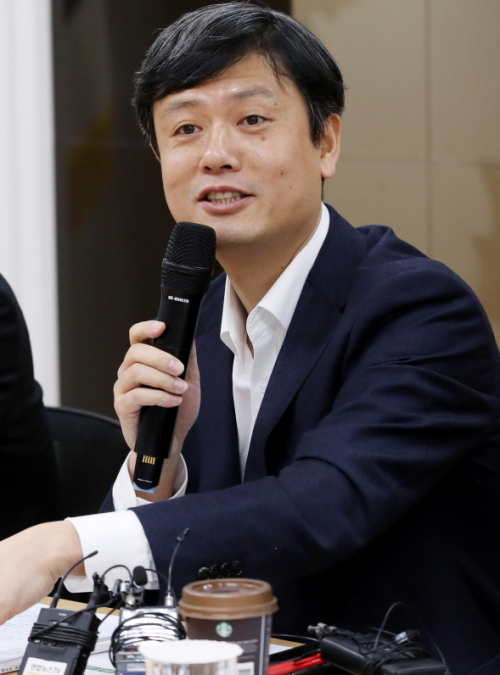[News Focus] Krafton’s valuation questioned ahead of IPO
By Kim Byung-wookPublished : June 27, 2021 - 18:08

Krafton, a South Korean game maker seeking an initial public offering in the country’s main stock market, faces delay in its listing plan amid ongoing scrutiny from both regulators and the market over its ‘overrated’ valuation.
On Friday, the Financial Supervisory Service, the country’s financial regulator, ordered the game developer to correct its registration statement.
The move is likely to delay the firm’s debut on the Kospi bourse, initially set for July 22, by several days at least. The FSS can issue such order if there is false information, an omission of important facts, or content that may undermine investors’ reasonable judgment or mislead them in major way.
“After reflecting on the issues raised by the FSS, we plan to submit the registration statement again next week,” an official at Mirae Asset Securities, the lead manager for the deal, was quoted by local media Sunday. “We expect a slight delay in the IPO schedule.”
Though the FSS didn’t clarify the exact reason for the correction order, industry watchers say Krafton’s valuation of 35.7 trillion won ($31.6 billion) may have played a part.
Based on that valuation estimate, the company seeks to raise up to 5.6 trillion won by offering 10,060,230 shares at between 458,000 won and 557,000 won each, it said in a prospectus earlier. At the top of the stock price range, this would mark the biggest IPO in the history of Korean capital market.
It would also put Krafton high above the industry’s No. 1 Nexon in market capitalization. Nexon, with revenue of 3.1 trillion won last year, is valued at 21.8 trillion won. Krafton’s revenue in 2020 was 1.6 trillion won, almost half of Nexon’s.
According to Mirae Asset, Krafton’s valuation is based on a price-to-earnings ratio of 45.2 times, the average of seven “comparable” companies, which include Walt Disney and the Warner Music Group.
As for the reasons to include Disney and Warner Music, it argues that Krafton is not a mere game firm, but a content company that utilizes intellectual property rights, just like the two US firms.
Krafton has released a short film, “Ground Zero” starring actor Ma Dong-seok, based on its one-hit-wonder shooting game PlayerUnknown’s Battlegrounds.
Should Krafton submit a revised version of the registration statement, it will go through a 15-day review of the FSS. It remains to be seen whether the firm would lower its valuation in the second attempt.
In the over-the-counter market on Friday, Krafton shares were quoted at 585,000 won apiece, higher than the top of the company’s initial IPO price range.
While Krafton’s jackpot-like success with a single game has garnered much attention from retail investors, market analysts advise caution, citing the risks involved. That the firm is almost entirely dependent on one game for revenue is a major risk factor that should be taken into account, they say.
Indicative of what could go wrong, Krafton has recently faced a backlash in India, where the mobile version of the PUBG has received over 20 million pre-registrations.
This month, Krafton was found to have sent the Indian user data to servers based in China, including those of China Mobile Communications Corp., a state-owned telecom operator. In a statement, the Korean firm admitted that data was shared to third parties, but said it wasn’t a violation of privacy policy, citing user consent for data transfer. When users in India migrated their data from PUBG Mobile Global accounts to Battlegrounds Mobile India, they had to accept Krafton’s data transfer terms. The data transfer was handled by Proxmia Beta Pte, which is based in Singapore and owned by Tencent Games, but users questioned why their data was sent to CMCC.
Following the controversy, which came amid heightened diplomatic and military tensions between India and China, politicians in India asked the Ministry of Electronics and Information Technology to look into the matter. In response, Krafton released an update to stop data-sharing with CMCC.
Krafton’s relationship with China’s Tencent Games could be a potential risk factor here as well, some say.
For years, Krafton has been telling the Korean media that its game PUBG had nothing to do with Tencent’s Peacemaker Elite, though two games looked almost identical.
As it turned out, Krafton used and still uses the Chinese game company as a local middleman to circumvent a business license registration process to service PUBG in the country, but under the name Peacemaker Elite. In China, every foreign game must get a business license from the authorities. In exchange, Krafton is receiving massive royalties from Tencent, the amount expected to have taken up 68.1 percent of Krafton’s revenue in the first quarter.
The reason why Krafton used Tencent as a middleman goes back to 2017, when Korea deployed a US-led missile defense system called THAAD on the Korean Peninsula. China, viewing it as a threat to the mainland, responded in economic retaliation against Korea and issued a de-facto ban on Korean games, not granting a single business license to a Korean game from March 2017 to November 2020. Krafton effectively evaded this ban through partnership with Tencent since 2019.
As Krafton prepares for the IPO, it was revealed that the firm’s ties with Tencent goes even deeper. The Chinese giant is the second-largest shareholder of Krafton, with over a 15 percent stake via an investment vehicle.
Although Krafton seems to have found a way to circumvent the Chinese ban for now, it might not be able to do so in the future, should Korea-China trade tensions aggravate, local industry insiders said.






![[KH Explains] How should Korea adjust its trade defenses against Chinese EVs?](http://res.heraldm.com/phpwas/restmb_idxmake.php?idx=644&simg=/content/image/2024/04/15/20240415050562_0.jpg&u=20240415144419)











![[Today’s K-pop] Stray Kids to return soon: report](http://res.heraldm.com/phpwas/restmb_idxmake.php?idx=642&simg=/content/image/2024/04/16/20240416050713_0.jpg&u=)